Advertisement
How A Small Performance Series Aims To Change Boston’s Arts Scene, And The World
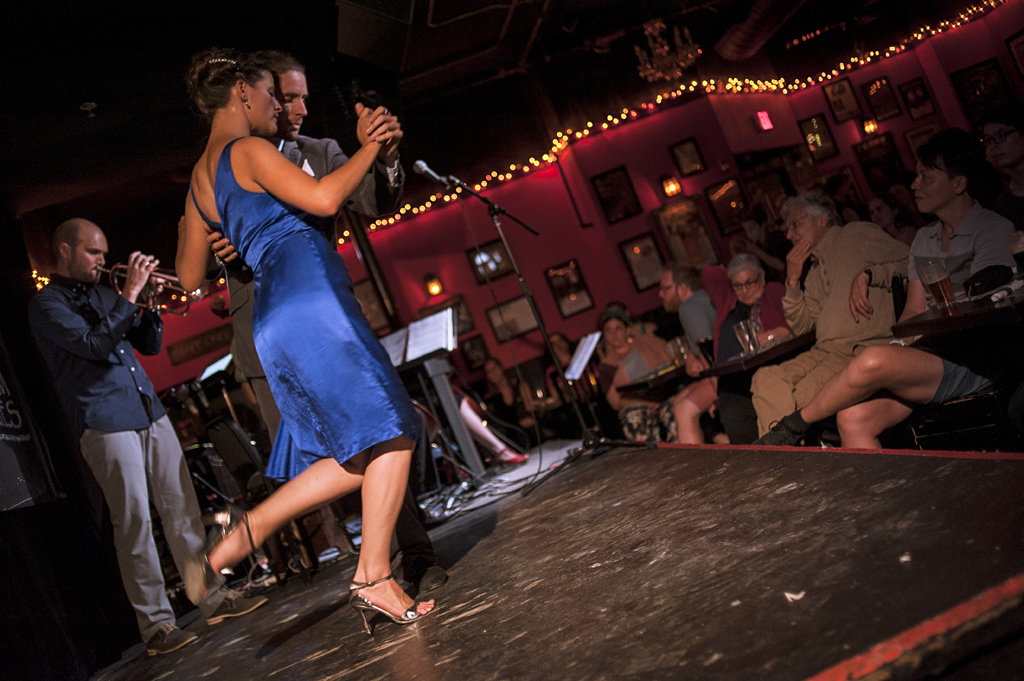
On a warm spring evening earlier this year, a small crowd gathered at the Lilypad in Cambridge. People trickled in slowly, settling in plastic chairs off to one side and by the makeshift bar near the door. The more intrepid souls stood out in the open, chatting quietly against the backdrop of mellow mood lighting and a hip soundtrack.
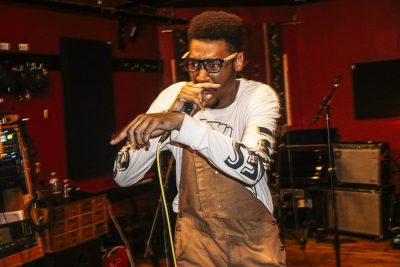
By the time a young rapper from Cambridge named Tashawn Taylor took the stage the small space had filled up, and the crowd surged forward to welcome him. Taylor sported a pair of overalls with one strap rakishly undone, and belied his confrontational rhymes with an ebullient stage presence. He was followed by Gene Shinozaki, a virtuosic beatboxer from New York City whose dense, futuristic rhythms had the audience in a frenzy. The crowd was rapt for Boston poet and activist Didi Delgado, though by the time the prog-ish band First Frost took the stage people had begun to disperse back into the night, pleasantly buzzed and with wonder on their lips.
The event was the fifth in a series called All Together Now that a local musician named Anna Rae launched in 2016. Her aims were ambitious from the start. Broadly, she hoped to connect people across difference; specifically, she wanted to incorporate a range of artistic genres, center marginalized identities, and facilitate cross-pollination between Boston and New York City. A tall order, in other words.
But Rae’s first four events were successful, and last year she was awarded a Live Arts Boston (LAB) grant from the Boston Foundation to continue the project with five more installments in 2017. (“That's huge. I would not have continued without funding,” Rae says.) Two remaining performances are planned for the fall: one on Saturday, Sept. 30 at the Midway Cafe in Jamaica Plain, and another on Saturday, Nov. 4, with details to be announced.
Rae spent much of the April event crouched near the edge of the stage, sharply attuned to everything that unfolded. Later, she sent me a thoughtful email dissecting the evening’s proceedings. This is typical of Rae, who is a deep thinker, generous yet precise, and resolutely allergic to sentiment. “I'm an artist, but I've never been like, ‘The world needs my music,’ ” she told me during an interview this summer. “I don't think it does. I think I could die tomorrow and everyone would be fine.”
Which is funny, because the social justice bent of All Together Now suggests a certain idealism — implicitly, at least, it rests on a belief that art can change the world. But Rae says the series was mainly just an outgrowth of her exhaustion with the same old thing.
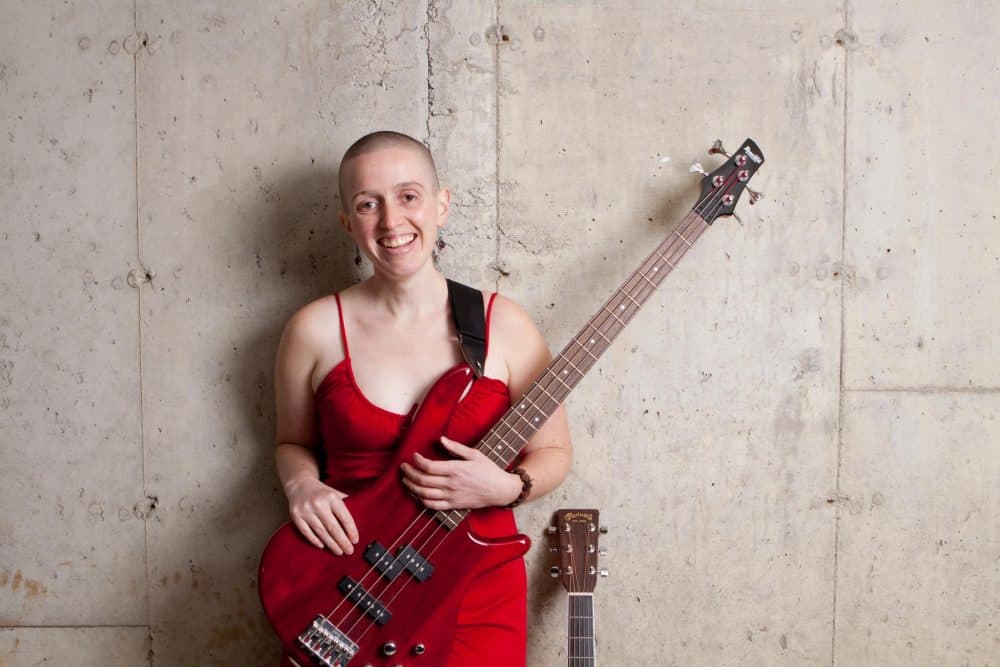
“I started to reach an irritation level with the way that rock is very white, male, hetero,” said Rae, who moved to Boston eight years ago and fronts the pop-rock band Hemway. “Every rock show has the same set of rituals, you know, and you pretty much know what you're going to get going into it. So I wanted to create shows that would be multidisciplinary, so that there would be more surprise and also access more of the senses. And then also create space for the people that I felt were being marginalized — in not just the rock scene, but basically any type of art event that I went to.”
Rae also wanted to build bridges with New York City, that teeming-with-art vortex into which Boston’s most promising young creatives are inexorably drawn. Why not flip it around, and bring New York performers back to the city that has incubated so many careers?
The first All Together Now featured Rae’s band Hemway, Boston singer-songwriter Jenee Halstead, experimental film from Cambridge artist Jeremy Stamas, pop-rock band The Grownup Noise and New York-based performance artist Crichton Atkinson. “Oh my god, that show, I totally bit off more than I could chew,” Rae told me.
Halstead remembers it differently. Yes, there were a few technical glitches, and the audience had to reorient itself in order to view Stamas’ film. But “it was the first time where I was in a performance environment where I felt like everybody was taking part in it. The audience was there, they were engaged, they were excited,” Halstead says. “And I saw a side of the Boston art community that I had never seen before.”
In subsequent iterations of All Together Now Rae has booked everything from a magician to dance troupes to drag performers, and of course many musicians. Women and LGBTQ artists have been a strong presence throughout, and the lineups are usually quite diverse. The upcoming installment features Paul Hansen of The Grownup Noise in collaboration with modern dancer Amy Cook, music and storytelling from Boston artist Tom Bianchi, New York-based poet and drag performer Wo Chan and local rock outfit Field Day.
Though the series’ multitude of objectives may seem to present a challenge, in some ways Rae’s goals operate in synchronicity. Achieving diversity, for example, is helped by a multidisciplinary approach. “I feel like hip-hop and rap are still very predominantly black, and rock is predominantly white,” Rae says. “So if you want to create a space where white people and people of color can co-create, you're going to have to incorporate the genres that those people are doing.”
The potential benefits of diversity and artistic cross-pollination are very concrete, Rae points out, since “resources such as venues or cash or materials” tend to get tied up in predominantly white art scenes.
Lamont Price, a Boston comedian who performed at an All Together Now event in August, describes Rae’s concept as freeing, both for artists and audiences.
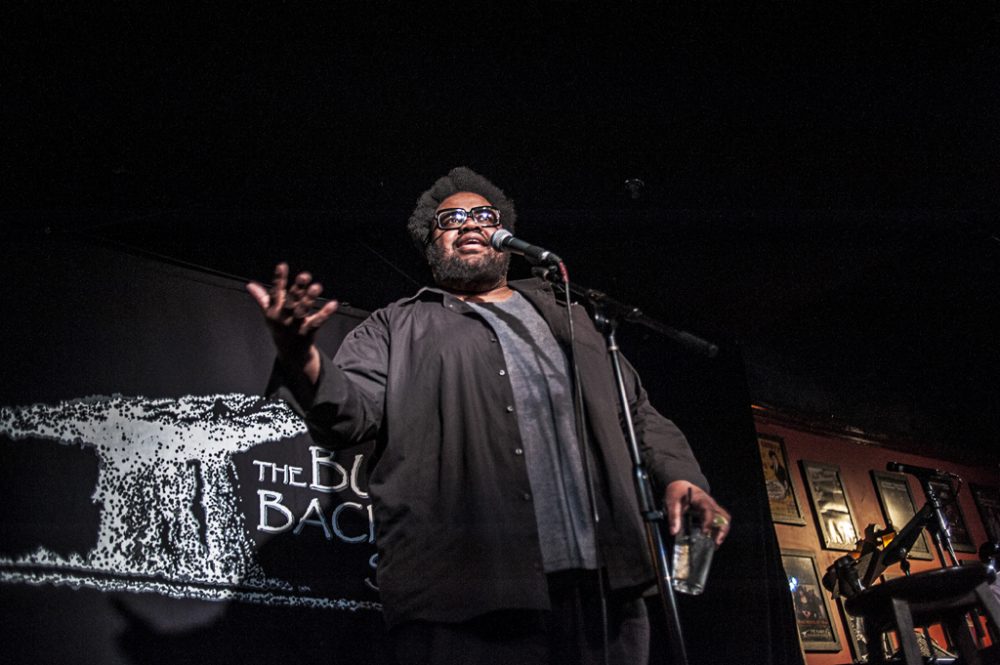
The people he encounters at comedy shows tend to be afraid to take risks when it comes to the entertainment they consume. Yet they are inevitably converted. “I'll talk to them afterwards, and they'll tell me that they never go to comedy shows,” Price says. “They make it sound like they went bungee jumping and the rope didn't snap.”
"I don't like when people are shocked that something is good," he adds. "It comes from such a closed-off mindset."
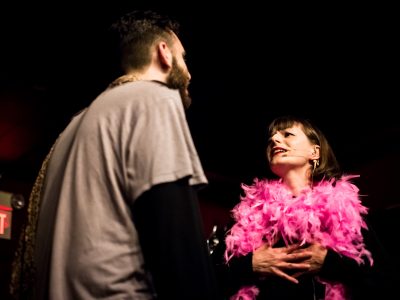
All Together Now's openness has inspired some participants to step beyond their comfort zones. In May, Halstead and Mark Lipman, both Boston-based singer-songwriters, debuted an original performance art piece that delved into deeply personal issues, including sexual assault. And in September, the musician Paul Hansen of The Grownup Noise and dancer/choreographer Amy Cook will perform a collaborative piece of music and movement.
It will be the first time Hansen has ever danced onstage. “It feels incredibly naked,” he admits. But having performed at the inaugural All Together Now, he finds himself emboldened by Rae’s vision -- one that he realizes is hard to pull off. Yet somehow, Hansen says, Rae “is nurturing something that's unique.”
Cook agrees. "We want to be open — we talk about it a lot. 'Oh, I want to live in a diverse community. I want to do this, I want to do that,' " she says. “But I think this show gives us an opportunity to put our money where our mouth is, and show up.”
Rae is characteristically careful not to overstate the potential for art to solve the world’s ills. “Does the existence of the human race hinge on it?” she says. “No.”
But she believes wholeheartedly in her mission. And, perhaps despite her best efforts, she describes it in terms that are profound.
“The more that people are kind of segregated in genre silos or their own little identity silos, it's easier to view people as less human or less whatever — less creative, less contributing to society, less going through the same kind of struggles you’re going through,” Rae says. “By combining races and genders and orientations in a single performance — it gives people an opportunity to realize that everyone else is just like them.”
All Together Now #7 happens on Saturday, Sept. 30 at the Midway Cafe in Jamaica Plain, and #8 will be on Saturday, Nov. 4, with details to be announced.

